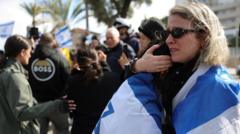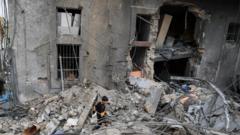The small coffins of Kfir and Ariel Bibas, who were taken hostage during a violent attack on October 7th, have been returned to Israel, prompting national mourning. While their mother remains missing, the boys were celebrated for their innocent lives cut short by violence.
Heartbreaking Loss: Israel Mourns Youngest Hostages Kfir and Ariel Bibas

Heartbreaking Loss: Israel Mourns Youngest Hostages Kfir and Ariel Bibas
The return of the bodies of child hostages Kfir and Ariel Bibas has ignited a wave of grief across Israel, as the nation struggles to come to terms with the horrific losses from the recent violence.
The return of Kfir and Ariel Bibas' bodies has plunged Israel into profound grief as it grapples with the loss of two young lives taken by violence. Kfir, just nine months old, and Ariel, four years old, were kidnapped from their home during the Hamas assault on October 7th, a tragic event that has since become a symbol of the ongoing conflict.
Their mother, Shiri Bibas, desperately clung to her boys as gunmen led them away, a heartbreaking scene witnessed by many who now mourn the innocent lives lost. The Bibas family had become emblematic of the anguish faced by families across Israel battling with the threat of violence. The kibbutz where the family lived, Kibbutz Nir Oz, described Kfir as a "calm and smiley baby" and Ariel as a "playful boy" with a joyful spirit who loved adventure.
In a statement, Israeli Prime Minister Benjamin Netanyahu condemned the actions of Hamas and paid tribute to the boys, expressing the national grief that echoes throughout the country. As he held up a picture of the young siblings, he noted, "Who kidnaps a little boy and a baby and murders them? Monsters. That's who," emphasizing the collective heartbreak felt by a nation mourning not only the Bibas children but also 1,200 other lives lost during the attacks.
The painful images of the boys in joyful moments, including snapshots of them in superhero costumes and playing with their family, serve as stark reminders of what has been lost. The loss reverberates beyond Israel's borders, with expressions of sorrow and solidarity from Jews and sympathizers worldwide. A visible symbol of this mourning has been the online sharing of broken orange hearts, representing the boys' striking ginger hair.
As Kfir and Ariel's bodies were transported back to Israel, mourners lined the streets bearing Israeli flags, articulating their sorrow with an almost universal expression of "sorry." This moment has resonated deeply with families affected by the violent conflict, emphasizing the communal nature of grief.
While Kfir and Ariel's bodies were returned, their mother, Shiri, remains unaccounted for, a haunting knowledge for their father, Yarden Bibas, who faces the unimaginable task of burying his sons alone. In heartfelt tributes shared online, family members have expressed their sorrow, underscoring a continuing hope for Shiri's return.
As the nation reflects on this tragedy, the poignant saying resonates: “The smallest coffins are the heaviest.” This loss is felt deeply, resonating across social, political, and cultural spectrums in Israel and beyond, as families and a nation grieve the unthinkable loss of life and innocence.





















